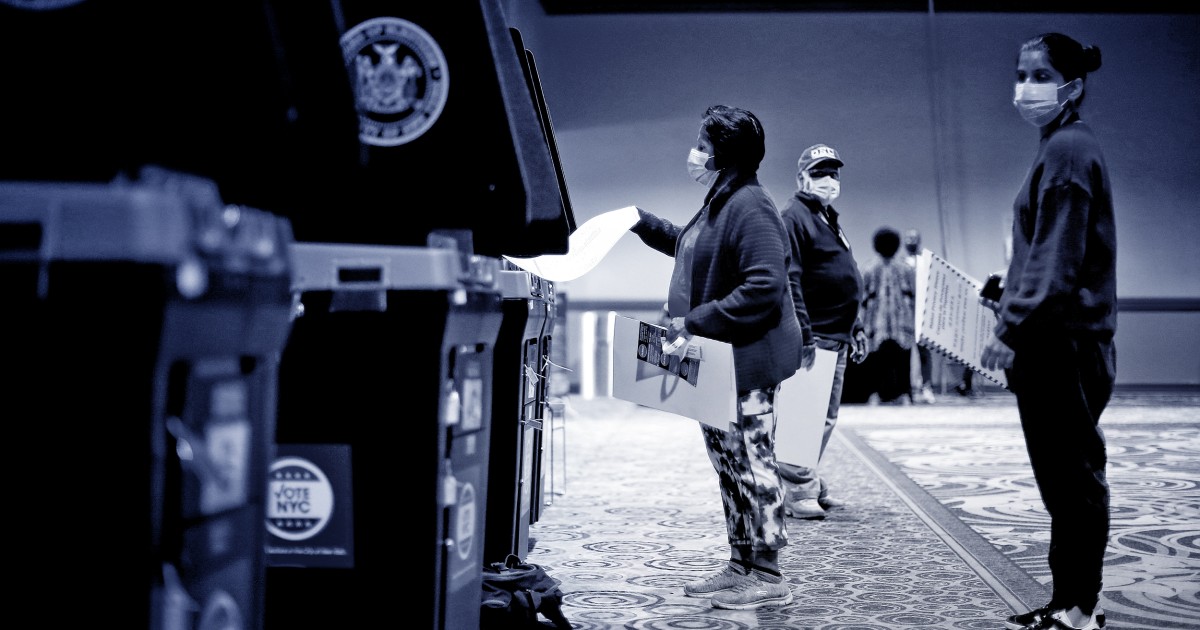
New York City Democrats will select the person likely to become the next mayor of the largest city in America on Tuesday after a characteristically colorful primary campaign will end in the city’s first use of ranked-choice voting.
Eight Democrats — including former presidential candidate Andrew Yang and the perceived front-runner Eric Adams — are vying for the party’s nomination to replace Mayor Bill de Blasio, a Democrat who is term-limited.
Yang was the early front-runner, but has slipped in the polls and been replaced by Adams, the Brooklyn borough president and a former New York Police Department captain, with Kathryn Garcia, a former sanitation commissioner, just behind him.
But the race is tight and the ranked-choice process makes it especially unpredictable. Also in the mix are two progressives, civil rights lawyer Maya Wiley and City Comptroller Scott Stringer — who has faced sexual misconduct accusations he strongly denies — while former Citigroup executive Ray McGuire has outspent the rest of the field and earned celebrity endorsements from the likes of Jay-Z.
Whoever wins will be heavily favored in November against the Republican nominee, either radio host and 1970s anti-crime activist Curtis Sliwa, or businessman and activist Fernando Mateo.
Here’s five things to watch for in the New York City mayoral race on primary day:
Ranked-choice voting
This will be the city’s first time using ranked-choice voting, which has added a new layer of volatility to the race and opportunities for backroom deal-making.
Voters overwhelmingly approved a 2019 ballot measure to implement ranked-choice voting, which allows them to list their preferences in order for up to five candidates.
If no candidate receives a majority of first-choice votes, the one with the fewest number of first-choice votes is eliminated and their votes get redistributed to other candidates based on their voters’ next choice. The process repeats itself until someone crosses the 50 percent threshold.
Voters’ second and third choices could prove decisive in the crowded primary, since even the leading candidate has only around 25 percent support in polls. That means the winner will likely require require lots of support from people whose first preference was another candidate, so lower-polling candidates have a chance to play kingmaker if they can steer their supporters in a certain direction.
A recent Ipsos poll placed Adams at 28 percent, with Yang at 20 percent, Garcia at 15 percent, Wiley at 13 percent, Stringer at 8 and the rest of the field in the low single digits.
Yang and Garcia campaigned together twice last weekend and while he urged supporters to rank her second after him, she did not return the favor. Adams and his supporters leveled accusations that the unorthodox strategy was “voter suppression” aimed at discouraging black and Latino voters from going to the polls.
About 192,000 people already cast their ballot during the early voting window that ended Sunday, according to the New York Board of Elections, and turnout tends to be low in New York City primaries. Turnout in the last contested Democratic mayoral primary in 2013 was just 20 percent.
The cop and the garbage chief
While Yang has star power, Adams and Garcia are more traditional city candidates.
Adams, an African American former NYPD captain-turned-politician and police reformer, has held a steady lead in recent polls. But his campaign has faced ethics complaints and questions about whether he actually lives in New York or another home he owns just over the Hudson River in Fort Lee, New Jersey.
His rise comes as crime seems to be on the upswing in many cities while racial justice activists and some Democrats, including several of Adams’ rivals, have pushed to defund police departments.
Garcia has remained a steady force in the race and earned coveted endorsements from The New York Times and New York Daily News.
She has been fierce debater in the three matchups against her Democratic competitors, leaning on her decades of experience in city government, which include stints running the Sanitation Department, the city’s Housing Authority, and serving as “food czar” to help people struggling during the Covid-19 pandemic.
The Yang effect
Riding the national profile he built running for president in 2020, Andrew Yang was the race’s early front-runner and held that position for months before the quirky unplanned moments that defined his public image began to catch up with him.
For instance, he lost the endorsement of a prominent LGBTQ group last month after he offended them with “cringe worthy” comments attempting to praise gay people. Most recently, his rivals blasted him for his remarks at the final mayoral debate, in which he said, “Yes, mentally ill people have rights, but you know who else has rights? We do!”
Rivals have alleged it’s all a sign of Yang’s lack of governmental experience and say he is not ready to manage the city’s massive bureaucracy that employs over 325,000 people.
Yang has also faced questions for his close ties to New York powerbroker Bradley Tusk and the powerful business interests the lobbyist represents, with some critics alleging that Tusk’s influence remade Yang from the plucky populist of his presidential campaign into a bloodless technocrat in the mold of former Mayor Michael Bloomberg, Tusk’s old boss.
Yang, who would be the first Asian American elected mayor of New York, has spoken out forcefully against the surge in anti-Asian American hate crimes and still has substantial backing from both local and national groups, including a police union and some prominent local politicians.
McGuire, also African American, has sought to differentiate himself as a political outsider with celebrity support, raking up endorsements from Jay-Z, LL Cool J, Nas, Sean “Diddy” Combs, Mary J. Blige, Steve Martin, Donna Karan and Naomi Campbell.
He has so far spent more than $10.5 million on the race, edging out next-highest-spender Adams’ $9.4 million. But so far, he has little to show for it, with support registering only in the low single digits in most polls.
Can progressives win in New York?
De Blasio, the two-term mayor who won his first Democratic primary by running to the left of every other candidate, sought to position himself as a national progressive leader, which included a short-lived run for president. But he has been widely mocked by many local and national Democrats for a wide range of personal and political foibles and seems eager to leave City Hall.
Progressives are eager for a high-profile win after a recent losing streak that includes President Joe Biden’s winning the 2020 Democratic nomination, key congressional races, and Terry McCaulliffe’s landslide victory over several more progressive candidates in the Democratic primary to be Virginia’s next governor.
Wiley is seen as progressives’ best hope, and her poll numbers shot up after a recent endorsement from Rep. Alexandria Ocasio-Cortez, D-N.Y., and Julian Castro, the former housing secretary and presidential candidate.
Wiley has run on reforming the NYPD and boosting social services in schools and communities, and has also received endorsements from Sen. Elizabeth Warren, D-Mass., and Rep. Jamaal Bowman, D-N.Y., who ousted longtime Bronx Democratic incumbent Eliot Engel, who was House Foreign Services Committee chair, in a primary last year.
For progressives, another loss, in New York City of all places, would be a tough break for a political movement trying to throw its weight around Washington and push the White House and Democratic congressional leaders to advance its agenda.
When will we know results?
Don’t hold your breath.
Because of the added complexities of ranked-choice voting and a greater use of absentee ballots than previous mayoral elections, results could take days or even weeks to be finalized if the race is tight. Absentee ballots can be postmarked by Tuesday and arrive up to a week later and still be counted.
Looking ahead to the general election in November, about 3.4 million of New York’s 5 million registered voters are Democrats, and about 500,000 are registered Republicans.
Source: | This article originally belongs to Nbcnews.com










